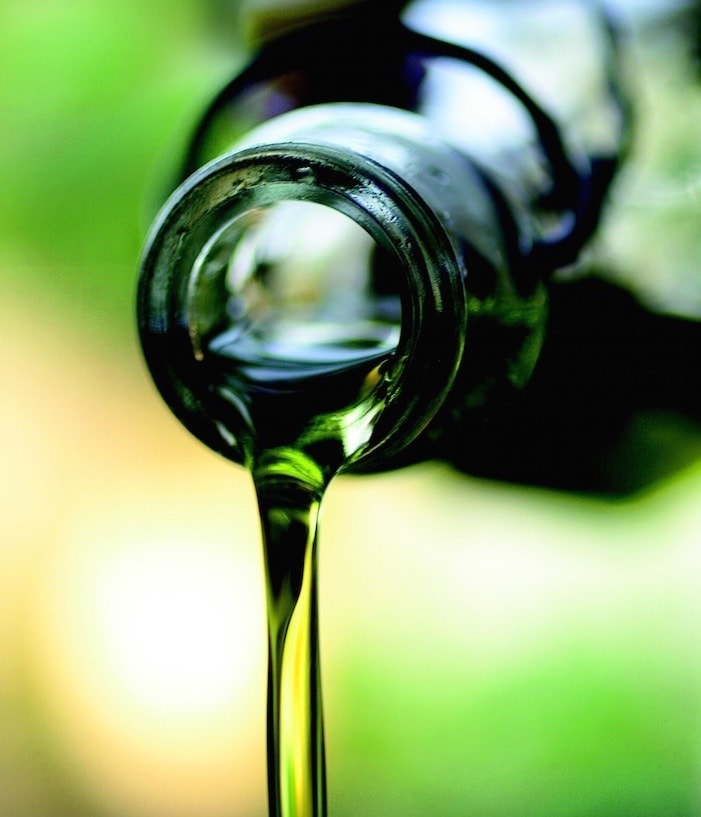Can You Really Tell if Your Olive Oil is Fake?
 After all the news about adulterated olive oil in the media, it comes as no surprise that many of us worry if the olive oil we are buying IS actually olive oil or extra virgin olive oil and not a blend of cheaper oils.
After all the news about adulterated olive oil in the media, it comes as no surprise that many of us worry if the olive oil we are buying IS actually olive oil or extra virgin olive oil and not a blend of cheaper oils.
There are several tips that I have presented in previous posts here and here on how to choose a good olive oil, but at the end of the day, can you really tell?
Well, I went to the expert with this question. Vasilis Kamvisis, Chemist and official taster for the Greek Ministry of Agriculture for Olive Oil, explained to me that even if an olive oil has that good burning-peppery sensation (presence of polyphenols), it is not a guarantee that the olive oil is extra virgin. First of all, it is important to note that there are good, milder tasting extra virgin olive oils that do not have that burning sensation as they may be from more mature olives or certain olive varieties that generally give a more buttery flavor. But basically he said that if you have a very intense oil in regards to the burning sensation (high polyphenols), and mix it with another oil (vegetable, seed), to the extent that the burning is still quite noticeable, an ordinary consumer would not be able to tell if it is adulterated. He mentions that detection of adulteration in olive oil is difficult even for the experts, if not impossible. According to Kamvisis detection of adulteration would have to be approached through a series of costly tests.
So there you have it, however there are few things one can look for when buying olive oil:
- Minimally it should have an expiration date which is usually about 1 ½ -2 years from harvest date, but even better look for a harvest date. Olive oil should be used ideally within one year of harvest.
- Obviously you want to make sure that it is labeled Extra Virgin Olive Oil as all other olive oils are a blend or made from refined olive oils, which means that it is processed physically and chemically to remove undesirable qualities such a free fatty acids and unpleasant flavor and odor.
- Choose olive oils that show where the olive oil was produced rather than bottled. Good olive oils will also specify the area from where the olive oil was produced as well as the variety of olives.
- Certifications such as PDO and PGI can provide an added degree of security. Also the USDA is in the process of inspecting olive oils based on certain standards.
Public Domain Image

The olive oil articles are very interesting.
I have been using store branded extra virgin olive oil from a mid level supermarket chain. No harvest date, no mention of olive variety, plain, dark plastic bottle. Uncool. It smells good, has a slight bitterness and definitely a kick in the back of the throat when sipped from a teaspoon. I was really surprised by the burning sensation. Had I not read your articles, I would have thought something was wrong with it. In actual use, I can’t detect any burning. I like it, the price is right, and I guess I will continue to use it.
Spartan oil is the best because higher elevations and rocky soil special fom Mani .Next is kalamata oil and Crette.Always buy greek and not Italian blend.
The North American Olive Oil Association tests olive oil found in the US market and has found that a very small percentage of the oil has any quality problems. Media reports about olive oil fraud are completely exaggerated.
http://blog.aboutoliveoil.org/olive-oil-fraud
Thanks for sharing.
Wonderful post, Elena!
Actually, I read quite a few.
I have been very interesting in olive oil and its benefits for years now. We use it like water in our household.
It’s funny that I was working last week on my essay on Eating like a Greek and olive oil is part of it.
I sent it to a friend editor and olive oil producer and wait for his comments.
I never came across your olive oil posts, though I visit your site when I catch a post of yours.
Be well,
Katina
Thanks Katina